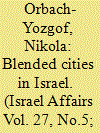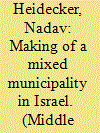|
|
|
Sort Order |
|
|
|
Items / Page
|
|
|
|
|
|
|
| Srl | Item |
| 1 |
ID:
181230


|
|
|
|
|
| Summary/Abstract |
This article presents a new conceptual and theoretical outlook on the municipal-demographic phenomenon of mixed cities, in which minority groups penetrate homogenous spaces. The findings show that the penetration of Jewish cities by Arab minorities in Israel has become widespread – especially in the periphery of the country. While the State and local authorities view this phenomenon as problematic – from a national, municipal, and demographic point of view, their solutions are limited to programmes that encourage increased Jewish residence in these cities to preserve the existing demographic advantage. Many of these mixed cities are characterised by increased tension between Arabs and Jews, decreased socioeconomic status, negative migration balance, and Arab minorities settling in the outskirts of the city or weaker neighbourhoods.
|
|
|
|
|
|
|
|
|
|
|
|
|
|
|
|
| 2 |
ID:
186156


|
|
|
|
|
| Summary/Abstract |
This article discusses the birth of the municipality in the city of Acre after the 1948 Arab-Israeli War. Hitherto a predominantly Arab city, Acre became a mixed city following the Palestinian exodus and the Jewish immigration wave. However, despite the sizable Jewish community, Acre, like other Arab-majority cities in the newly-established Jewish State, was placed under military rule. The article examines archival material to draw out the local power struggles in Acre until the lifting of the military rule in the city and the election of its first mayor in October 1951 and explores the intricate interrelations between the local actors and the central government. Acre thus serves as a case study for an analysis of the tactics used by Mapai, Israel’s ruling party, to combat its political rivals in the Arab sector—most notably the Israeli Communist Party—and exert its hegemony over Israel’s Arab minority.
|
|
|
|
|
|
|
|
|
|
|
|
|
|
|
|
| 3 |
ID:
193279


|
|
|
|
|
| Summary/Abstract |
This study seeks to understand what was behind the May 2021 violence of the Arab minority in Israel, particularly in mixed cities: was it national, religious or civic motives, or a combination of them? Historically, relations between Jews and non-Jews (mostly Muslims) in Israel circle around three axes: religious, national, and civic. While the fragile relations between the parties enjoy a quiet routine, a serious escalation is recorded from time-to-time, leading to a crisis between the parties. This was the case in May 2021, when an outbreak of severe Arab violence was recorded in mixed cities in Israel that resulted in three victims (two Jews, one Arab), dozens of injuries, and heavy damage to Jewish property. This qualitative research, based on interviews with Arab residents in mixed cities and media reports during the clashes and afterward, concludes that despite all three components having a significant contribution to May 2021 violent conflicts, civil affairs were the main reason for riots in mixed cities; however, the outbreak has a national and religious historical background.
|
|
|
|
|
|
|
|
|
|
|
|
|
|
|
|
|
|
|
|
|